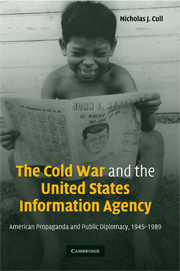 The Cold War and the United States Information Agency
The Cold War and the United States Information Agency Book contents
- Frontmatter
- Contents
- List of Illustrations
- Preface
- Abbreviations
- THE COLD WAR AND THE UNITED STATES INFORMATION AGENCY
- Prologue
- 1 Getting the Sheep to Speak
- 2 Mobilizing “the P-Factor”
- 3 In the Shadow of Sputnik
- 4 Inventing Truth
- 5 Maintaining Confidence
- 6 “My Radio Station”
- 7 Surviving Détente
- 8 A New Beginning
- 9 From the “Two-Way” Mandate to the Second Cold War
- 10 “Project Truth”
- 11 Showdown
- Epilogue
- Conclusion
- Selected Bibliography
- Index
- Plate section
3 - In the Shadow of Sputnik
The Second Eisenhower Administration, 1957–61
Published online by Cambridge University Press: 05 February 2015
- Frontmatter
- Contents
- List of Illustrations
- Preface
- Abbreviations
- THE COLD WAR AND THE UNITED STATES INFORMATION AGENCY
- Prologue
- 1 Getting the Sheep to Speak
- 2 Mobilizing “the P-Factor”
- 3 In the Shadow of Sputnik
- 4 Inventing Truth
- 5 Maintaining Confidence
- 6 “My Radio Station”
- 7 Surviving Détente
- 8 A New Beginning
- 9 From the “Two-Way” Mandate to the Second Cold War
- 10 “Project Truth”
- 11 Showdown
- Epilogue
- Conclusion
- Selected Bibliography
- Index
- Plate section
Summary
Whether you like it or not, history is on our side. We will bury you.
Nikita Khrushchev, 18 November 1956The USIA began Eisenhower's second term warmed by the glow of accomplishment. The agency's managers felt that their staff had worked well in the field, and the USIA director increasingly shared in foreign policy-making. On 25 February 1957, a presidential executive order mandated the director's full membership of the Operations Coordinating Board and located the board within the framework of the NSC. The agency's place within the foreign policy structure was secure. On that same day, Eisenhower celebrated the fifteenth anniversary of the VOA by becoming the first President to address the world directly from its studios. The USIA estimated the audience at around 350 million. But unlike the first term, the course of U.S. information in the second Eisenhower administration would not be defined by initiatives from Washington. The terrain of Cold War propaganda was changed utterly by a beeping 22-inch metal sphere from the Soviet Union, weighing around 183 pounds, trailing four antennas, and named “traveling companion,” or in Russian, “Sputnik.”
The Soviet launch of Sputnik, on Friday 4 October 1957, pitched humanity headlong into the Space Age. The news broke at around six in the evening Washington time. “Sputnik Night” became one of those news events so potent as to print itself indelibly on the memory of those who lived through it. America responded as to a mixture of Lindbergh flying the Atlantic and Pearl Harbor.
- Type
- Chapter
- Information
- The Cold War and the United States Information AgencyAmerican Propaganda and Public Diplomacy, 1945–1989, pp. 134 - 188Publisher: Cambridge University PressPrint publication year: 2008


